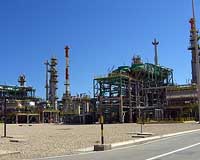 |
Luanda (AFP) Dec 23, 2009 A surge from Iraq's oilfields will occupy OPEC crude producers in coming years as the recovering country's output challenges that of Saudi Arabia, observers said as the cartel held its latest meeting. Iraq has signed several contracts this month with foreign oil companies and said it could raise production to 12 million barrels a day by 2016 -- a level to rival Saudi Arabia, the world's biggest oil producer. Iraqi Oil Minister Hussein al-Shahristani insisted Iraq will have a strong market for this oil in the coming decades, despite pressure from world powers to reduce use of carbon fuels to protect the environment. "We expect the demand for oil to increase over the coming 20 years," he told AFP at Tuesday's meeting. "There is definitely a need in the market for additional production and... there is no better place than Iraq to provide it." Delegates at Tuesday's talks said they had not yet broached the question of admitting Iraq into the group's quota system, focussing instead on economic threats that could weaken the recovery in the oil market. Kuwait and others have also insisted they are not concerned by Iraq's prospective rise. But analysts said Iraq's expansion would be weighing on members' minds in the medium term. "In a five-year perspective there could be a big issue for OPEC how to incorporate Iraq into the quota system, as Iraqi output is set to increase quite a lot," wrote Torbjorn Kjus, an Oslo-based analyst at DnB NOR Markets. Saudi Arabia's Oil Minister Ali al-Naimi left open the possibility that his country, the most powerful in OPEC, could cut some of its output -- currently at more than eight million barrels day -- to accommodate Iraq's increase. "That's going to take some give and take," he told reporters in Luanda. "It depends on what demand is." Since 1990 Iraq has been exempt from the quotas, which aim to limit production in order to stabilise prices. But in five years this will change, analysts say, as the flow from its oilfields swells. Shahristani told reporters on Sunday he did not expect to tackle the question of production allowances for Iraq for some time. He did hint however that Iraq would seek the right to raise its production on the grounds that it is recovering from years of war. "Countries' needs for reconstruction should be one of the top criteria in addition to countries' capacities of production," he told reporters. "In the case of Iraq we have been deprived of the fair share of the world market and this should be taken into account." Kjus said Iraq could gain the momentum to merit production quotas when its daily output reached 3.5 million barrels a day (bpd). "Current Iraqi production is 2.5 million bpd and it is unlikely that Iraq will reach 3.5 million before 2012-2013, so this is an issue the cartel will probably put on the shelf for now," he wrote. Baghdad-based oil expert Ruba Husari forecast that Iraq's rise would shake up OPEC and Saudi Arabia would be its biggest rival. "It's going to be an important balancing act within OPEC to preserve the cohesion within the organisation while at the same time satisfy Iraq's huge needs which are bigger than any other member's," she wrote. "Iraq's potential return as a major oil producer undoubtedly creates a challenge for Saudi Arabia more than any other member in OPEC." Despite uncertainty over the pace of recovery in the world economy next year and a UN-sanctioned drive to reduce carbon emissions, experts forecast that demand for oil will rise in coming years -- good news for all OPEC members. In the wake of last week's UN summit on climate change, Iraq and other OPEC players said the rich world should bear the burden of reducing harmful carbon emissions -- a shift which may harm their crucial exports. "The big consumer countries... should really take responsibilty for the way they handle the fuel that they purchase from OPEC or elsewhere. You cannot blame the producer," he told AFP. "There isn't much that OPEC can do to reduce the emissions, other than cutting the supply and creating another economic crisis." He added: "We fully support any effort to reduce carbon emissions but we don't believe that there is sufficient alternative energy to replace the current oil demand." Share This Article With Planet Earth
Related Links Powering The World in the 21st Century at Energy-Daily.com
 Method Makes Refineries More Efficient
Method Makes Refineries More EfficientWest Lafayette IN (SPX) Dec 23, 2009 Refineries could trim millions of dollars in energy costs annually by using a new method developed at Purdue University to rearrange the distillation sequence needed to separate crude petroleum into products. The researchers have demonstrated their method on petroleum plants that separate crude, showing that 70 of the new sequences they identified could enable oil refineries to improve the ... read more |
|
| The content herein, unless otherwise known to be public domain, are Copyright 1995-2009 - SpaceDaily. AFP and UPI Wire Stories are copyright Agence France-Presse and United Press International. ESA Portal Reports are copyright European Space Agency. All NASA sourced material is public domain. Additional copyrights may apply in whole or part to other bona fide parties. Advertising does not imply endorsement,agreement or approval of any opinions, statements or information provided by SpaceDaily on any Web page published or hosted by SpaceDaily. Privacy Statement |